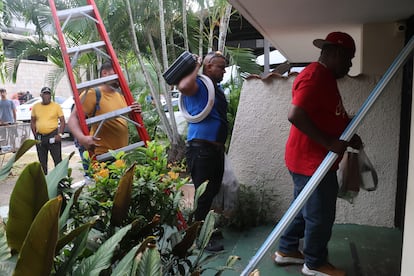Daniel Ortega turns Nicaragua into a haven for corrupt politicians and criminals
The Sandinista Government grants asylum to ex-Panamanian president and convicted money launderer Ricardo Martinelli, the latest in a long line of fugitives


The Nicaraguan Embassy in Panama is located in the La Alameda area of Panama City. The tranquil, middle-class neighborhood was roiled on February 7 when word got out that former President Ricardo Martinelli, who was convicted last year of corruption and large-scale money laundering, was seeking asylum with the Daniel Ortega and Rosario Murillo government.
Martinelli sent workers that day in trucks and vans, who began unloading tools and materials to repair the old house’s roof and paint the walls. La Prensa de Panama reported that Martinelli brought in two Nisato-brand air conditioners, a 32-inch television, a 65-inch RGA-brand television, a large water tank, a family-sized gas grill, and his pet dog, Bruno.
Martinelli’s move into the embassy sparked a diplomatic squabble between Panama and Nicaragua. That same day, Managua granted political asylum to Martinelli, who has vowed to run for president again. According to Nicaragua’s Foreign Ministry, the country “decided to grant asylum to Ricardo Alberto Martinelli Berrocal, the former president of the Republic of Panama, in accordance with the 1928 Convention on Asylum and the 1933 Convention on Political Asylum, which our country has ratified.” The Nicaraguan Foreign Ministry noted that asylum is a humanitarian institution that protects all people, regardless of nationality. Panama strongly opposed the asylum, arguing that Martinelli is not a political refugee but a convicted criminal. Just last week, a judge upheld the former leader’s 10-year prison sentence and $19-million fine for money laundering.
When the Nicaraguan government asked for safe passage for Martinelli so he could travel to Nicaragua for permanent asylum, Panama’s Foreign Ministry summoned Nicaraguan Ambassador Consuelo Sandoval Meza to receive its formal denial of the request. “Any action, statement, or communication originating from former President Ricardo Alberto Martinelli Berrocal within the embassy that has repercussions or impacts on Panama’s domestic politics, will be deemed as interference in our country’s internal affairs. Consequently, such actions will result in diplomatic consequences,” warned the Panamanian Foreign Ministry.
130 passports issued to corrupt individuals and political allies
While Martinelli is taking shelter in the Nicaraguan Embassy in Panama City, his move has highlighted a recurring pattern of the Ortega-Murillo government: providing refuge to corrupt individuals and criminals who have fled justice in their home countries.
Two former presidents of El Salvador, Mauricio Funes and Salvador Sánchez Cerén, are wanted for diverting public funds and corruption. Both leaders of the Farabundo Martí National Liberation Front (FMLN) were granted asylum, along with their families, and later obtained Nicaraguan citizenship to avoid extradition.
The Sandinista government recently granted asylum and Nicaraguan citizenship to Hondurans Ebal Jaír Díaz Lupian and Ricardo Leonel Cardona López. The two have close ties to former Honduran President Juan Orlando Hernández, who is facing drug trafficking charges in the United States. In 2018, Gustavo Adolfo Herrera Castillo, a Guatemalan national, was also granted asylum in Nicaragua. He had fled charges of defrauding the Guatemalan Social Security Institute by the now-defunct International Commission against Impunity of Guatemala (CICIG).
In 2008, Ortega granted political asylum to Doris Torres, Martha Pérez, and Lucía Morett, who were guerrillas from the now defunct Revolutionary Armed Forces of Colombia (FARC). Another refugee, Mario Eduardo Firmenich, formerly led the Montonero guerillas in Argentina during the 1970s and was pardoned by President Carlos Menem in 1990.
According to the Confidencial news outlet, Ortega “has given Nicaraguan citizenship to 130 political allies and fugitives from justice” in the last two years. “Several naturalization processes were carried out in breach of Nicaraguan immigration laws... much like 317 Nicaraguans were stripped of their citizenship and made stateless.” The Managua offices of Confidencial were seized by the Nicaraguan government and its reporters were forced into exile.
“Ortega is not granting asylum to people facing political persecution or whose rights have been violated. Instead, he is providing shelter to convicted criminals who seek to evade accountability for the harm they caused in their respective countries,“ said Luciano García, an exiled Nicaraguan opposition leader in Costa Rica and director of the Hagamos Democracia organization.
Even Pablo Escobar
Ortega and the Sandinistas have a long history of providing refuge to convicts and criminals. Thirty-six years ago, Alessio Casimirri, an Italian fugitive wanted for the kidnapping and murder of Prime Minister Aldo Moro in 1978, arrived in Nicaragua. Casimirri still lives in Managua, where he owns a seafood restaurant called La Cueva del Buzo.
During the 1980s, when the Sandinistas were in power and the Medellín Cartel was growing, drug traffickers Pablo Escobar and Carlos Lehder sought shelter in Nicaragua. “I was assigned a spacious diplomatic guest house as my residence. I brought along my G3 rifle, personal weapons, a backpack filled with dollars, a powerful HF Global radio, and my Zenith radio. During the day, I used the Zenith radio to listen to music, and at night, I monitored the Colombian stations and The Voice of Germany (Deutsche Welle),” Lehder wrote in his recently released book, Life and Death of the Medellín Cartel.
As Ricardo Martinelli’s asylum drama plays out, exiled Nicaraguan opposition leader Félix Maradiaga says Ortega has undermined the true purpose of political asylum. “It should protect people who have been genuinely persecuted for their ideals, not serve as a safe haven for corrupt convicts seeking to evade justice.”
“Nicaragua as a sanctuary for accused individuals like Mauricio Funes, Salvador Sánchez Cerén, and Ricardo Martinelli contradicts international law and undermines the integrity of legitimate asylum. This irony perpetuates impunity, erodes justice, and dishonors national dignity by welcoming criminals while stripping patriots of their nationality,” said Maradiaga, who was exiled last year along with 221 other political prisoners. “By sheltering criminals, Ortega betrays his people and damages the country’s reputation. This just adds to his legacy of complicity with crime and impunity.”
Sign up for our weekly newsletter to get more English-language news coverage from EL PAÍS USA Edition
Tu suscripción se está usando en otro dispositivo
¿Quieres añadir otro usuario a tu suscripción?
Si continúas leyendo en este dispositivo, no se podrá leer en el otro.
FlechaTu suscripción se está usando en otro dispositivo y solo puedes acceder a EL PAÍS desde un dispositivo a la vez.
Si quieres compartir tu cuenta, cambia tu suscripción a la modalidad Premium, así podrás añadir otro usuario. Cada uno accederá con su propia cuenta de email, lo que os permitirá personalizar vuestra experiencia en EL PAÍS.
¿Tienes una suscripción de empresa? Accede aquí para contratar más cuentas.
En el caso de no saber quién está usando tu cuenta, te recomendamos cambiar tu contraseña aquí.
Si decides continuar compartiendo tu cuenta, este mensaje se mostrará en tu dispositivo y en el de la otra persona que está usando tu cuenta de forma indefinida, afectando a tu experiencia de lectura. Puedes consultar aquí los términos y condiciones de la suscripción digital.








































